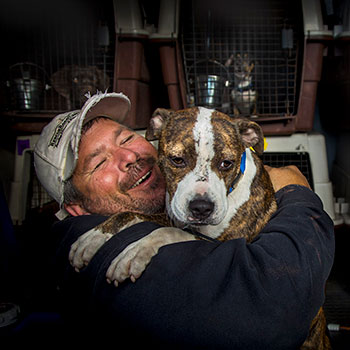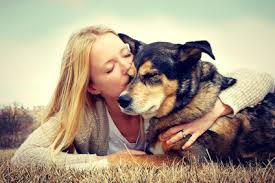Animal Radio "Hero People"
Greg Mahle, Rescue Road Trips
 Our Hero People series showcases humans that are going above and beyond the call of duty to make our animal's lives better. Greg Mahle is one of those people. Greg spends much of his time on the road delivering death row animals to adoptable homes.
Our Hero People series showcases humans that are going above and beyond the call of duty to make our animal's lives better. Greg Mahle is one of those people. Greg spends much of his time on the road delivering death row animals to adoptable homes.
Greg Mahle has helped save tens of thousands of dogs. His transport service, Rescue Road Trips, just about breaks even (a portion of adoption fees covers his costs). But Greg, who ran a family restaurant in his prior life, doesn't do it for the money. He states this is the happiest he has been in his whole life.
There is an abundance of adoptable dogs in the south, according to Greg, but there is not an abundance of adoptable dogs in the north. He goes on to say that this does not mean that the north does not have dogs in their shelters, they do, but there is a wider selection of adoptable dogs in southern shelters.
His familiar route goes through the Deep South, making stops in Texas, Louisiana, Mississippi, and Alabama to pick up dogs that have been removed from "death row" at high kill shelters by local rescue groups. Then Greg turns north toward New England, where there is a higher demand for shelter dogs.
Each trip usually consists of around 100 animals. Greg works with rescuers in the south who actually go into the shelters and pull animals from "Death Row." They select dogs that seem most adoptable and vet them with a temperament test. They then list the adoptable dogs on PetFinder to find them homes. When someone is interested in a particular dog, they screen potential adopters to make sure the dog is going to a good forever home.
All of these dogs are going to an individual family or directly into a foster home. However, most of the dogs do go directly into new homes. Greg will have arranged a place to meet the new family, and when he arrives, the family is there, jumping up and down with tears in their eyes as they greet their new family member. Greg states it is a very joyous occasion!
 But it is not just Greg who is doing all the work. He has tons of help. He has many volunteers, called "Angels," who are stationed along the way to come out to a designated spot to feed the dogs and get them out for walks. There are some dogs that need reassurance, and the Angels are there to love them.
But it is not just Greg who is doing all the work. He has tons of help. He has many volunteers, called "Angels," who are stationed along the way to come out to a designated spot to feed the dogs and get them out for walks. There are some dogs that need reassurance, and the Angels are there to love them.
Greg was aware of transports that were made one leg at a time, which consisted of many people to complete a journey. Greg says these transports don't work very well, because you had to rely on so many people, there is always someone who doesn't show up to do their end and the dog is left stranded. Plus, it only moves one dog at a time.
So why does Greg do it? He was retired and felt he was going to be living on a farm the rest of his life, not doing anything. He was then introduced to rescue and the transport end of rescuing and became fascinated. His love of animals drew him to it like a magnet.
Greg has a soft spot for all of the dogs he transports and he falls in love with each and every one of them. There have even been dogs where Greg had tears in his eyes when handing them over to their new families. This just made him want to do it again and again and again!
Visit Website
Who's The Smartest?
Dr. Diana Reiss, Inside Animal Minds
 Dr. Diana Reiss, who specializes in dolphin and elephant cognition, doesn't like to compare animal smarts, but she is fast to explain just how smart dolphins and elephants are and their ability to recognize themselves in the mirror. It was all part of PBS's NOVA - "Inside Animal Minds."
Dr. Diana Reiss, who specializes in dolphin and elephant cognition, doesn't like to compare animal smarts, but she is fast to explain just how smart dolphins and elephants are and their ability to recognize themselves in the mirror. It was all part of PBS's NOVA - "Inside Animal Minds."
Dr. Reiss doesn't really talk to these animals, but she tries to understand how they communicate, how they think, because they do think. Other animals think as well, they just do it differently.
With regard to dolphins, they not only seem to have a sense of other, but of themselves as well. This means that they can recognize themselves in a mirror. There was even a study to see how young they start to recognize themselves.
While our dogs and cats are smart in their own ways, they don't have this ability. They don't understand when they see their own reflection in the mirror, that it's them. They just don't process that kind of information the same way that dolphins, elephants apes or even we do.
Magpies are another example of an animal that does have self-awareness. They may see you behind them, and look at you in the mirror, but they don't pay attention to themselves.
All animals that recognize themselves in mirrors show the same three stages in learning how to use a mirror. First, they all act like they are looking at someone else in a mirror. Second, they start doing repetitive behaviors, this is where they seem to figure out that what they're doing has something to do with what's going on in the mirror and the light bulb goes on. Lastly, they use self-directed behaviors. They use the mirrors as a tool to see parts of their bodies that they can't normally see.
 Interestingly, both dolphins and elephants show very similar behaviors at a mirror and are interested in looking at certain parts of their bodies that we do. They look into their eyes and inside their mouths. Dr. Reiss says that it is fascinating that they're interested in looking at those parts of their bodies, just like we are.
Interestingly, both dolphins and elephants show very similar behaviors at a mirror and are interested in looking at certain parts of their bodies that we do. They look into their eyes and inside their mouths. Dr. Reiss says that it is fascinating that they're interested in looking at those parts of their bodies, just like we are.
When asked what is the smartest animal, Dr. Reiss doesn't like the comparison of, "Who's the Smartest?" because she feels all animals (including human animals) are all smart in their own way. She would rather discuss how animals are smart, instead of who's the smartest.
For example, a dolphin is going to be a lot better than us, and maybe even smarter than us, in doing certain things in their world than we could do in their world. While we are smarter at erecting buildings, we're not catching fish like they do by encircling fish, making mud rings.
Visit Website
Who Doesn't Like Dogs? - Dr. Debbie
 I love dogs, and always have. But what happens when you discover a close friend doesn't merely not like dogs, but actually hates them?
I love dogs, and always have. But what happens when you discover a close friend doesn't merely not like dogs, but actually hates them?
I've been operating under the assumption that those who don't like dogs must have some evil lurking in their spirit and were destined to a life of incarceration. Just look at the statistics of criminals that abuse animals early on and who later progress to physical abuse of people, murder, or other sociopathic behaviors.
I'll admit not liking dogs is a far cry from turning one's hand to injure an animal or person, but some uncomfortable association is still there. As a full-fledged dog lover, or enthusiast of any animal for that matter, I cannot understand the psyche of an individual that is satisfied going about their life without animal companionship.
Any pet lover can spout off a list of benefits their furry one brings to their life…the steady comfort of companionship, a non-judging ear to hear out the day's tribulations, a workout or hiking buddy and a source of unconditional love at the end of a long day.
So, imagine my shock when I realized that a couple I know doesn't like dogs. Not just that they don't have dogs or misunderstand them - they actually dislike dogs.
Hint of this fact should have been apparent long ago when they were over for dinner and they politely stood stiff as a Calvary front line, when greeted by my yapping terrier mix. Or that they failed to stroke my Labrador's chin after receiving the gentle nudge of the typical canine greeting upon entering the home. The polite perfunctory smiles went un-noticed by me. "Sure, they don't have dogs," I reasoned as to why they weren't charmed by my little dog's amusing tail wagging display or by the steadfast devotion of my Labrador's greeting.
All of these sign posts I missed. I clearly misjudged all along. The couple, who I just assumed were just not yet fortunate to understand the benefits of pet companionship, were actually formidable dog dislikers.
Realization struck me during a recent conversation with this couple. I was laughingly describing the vast differences in dog breed behavior comparing my former Labradors, to that of my current Bouvier. My comments must have been mistaken as some underhanded means to convince them the right breed was out there for them. At that moment, my guest raised hands and said, "I know what I like and don't like, and I don't want dogs." Clearly they didn't like dogs - and they misunderstood my comment as some means to turn them over to the canine side against their will. Astounded, I marveled how this response was not unlike a person who is recommended a mushroom containing side dish or gourmet meal from a fine restaurant, and who declares "I can't stand mushrooms and don't want anything to do with mushrooms!"
 So why didn't I catch on to these dog haters sooner? For those of us that have pets, of any type, we recognize the many joys our pets bring to our lives. There are folks that don't want to bring that companionship into their life. The cogs of their lives have clicked along just fine without a pet in their life. Somehow lots of well-educated, social and seemingly normal people can raise a family and be successful and still dislike dogs.
So why didn't I catch on to these dog haters sooner? For those of us that have pets, of any type, we recognize the many joys our pets bring to our lives. There are folks that don't want to bring that companionship into their life. The cogs of their lives have clicked along just fine without a pet in their life. Somehow lots of well-educated, social and seemingly normal people can raise a family and be successful and still dislike dogs.
Maybe we should feel sorry for them. Or maybe they feel sorry for us, for all the money, heart and time we put into a pet companion who's lifespan doesn't come near to that of a humans. They probably laugh at our reckless expenditures on a being who lives just a fraction of human life. I chose not to spend time wondering how they have made it without animals in their life…rather that I have succeeded because I have been fortunate to have animals in my life.
I ask that these non-pet people save their pity for me and my pets, because I know that any one of my dogs could say they lived life fuller than most people - full with adventure, splendor at new experiences and embracing the moment. And so have I at their side. So should the question come up at the time of my next life, I'll take both a side of mushrooms…and pets on the side.
Featured veterinarian known as "Dr. Debbie" on national pet radio program, Animal Radio. Ebook author of "Yorkshire Terriers: How to Be Your Dog's Best Friend"; "Pugs: How to Be Your Dog's Best Friend"; "Mini Schnauzers: How to Be Your Dog's Best Friend"; and "Shih Tzu: How to Be Your Dog's Best Friend." Dr. Debbie's books.
Visit Website
Animal Radio News - Tammy Trujillo
 Dog Found Over a Year After Hurricane
Dog Found Over a Year After Hurricane
Lots of people lose just about everything during hurricanes. Some families lose things that are impossible to replace, like their dogs. But one family got a call from the police in a town about 20-miles away, telling him that their dog had been found, 17 months later. At first the family thought someone was playing a nasty joke, but it wasn't. A woman had spotted their dog wandering around, corralled him and called police. He was easily identified because of his microchip. No one knows where he had been all this time, but he was about 20-pounds heavier so it was obvious he had been spoiled rotten.
 Yawning Is Contagious To Dogs
Yawning Is Contagious To Dogs
We all know that yawning is contagious, but have you ever noticed that when you yawn in front of your dog, it often triggers a yawn from your dog? A study suggests that yawning is contagious to dogs as well. In the study, even the sound of a human yawn was enough to trigger the dogs to yawn. And it seems that dogs can learn the sound of their own guardian's yawn. The dogs were five times more likely to yawn when they heard a recording of that particular yawn. Researchers at the University of Porto in Portugal said it could be a key element in proving a dog's ability to empathize with us. This is not the first study conducted on this. A previous experiment at the University of London's Birkbeck College found that dogs mimic a yawn about 75-percent of the time after seeing a human doing it. Contagious yawning has also been studied in chimpanzees, baboons and macaques.
Counting Calories Adds Years To Primates
Counting calories could help rhesus monkeys live longer and healthier. The average life span of the monkeys in captivity is about 26 years, but more than half of the ones in a study on calorie-restricted diets lived to at least age 30. The study was done at the Wisconsin National Primate Research Center and it also found that the animals not on calorie-restricted diets had nearly triple the risk of age-related disease, compared with those in the calorie-restricted group. The results suggest that calorie restriction could improve longevity and health in other primates, including humans.
 Cars Recalled Because of Spiders
Cars Recalled Because of Spiders
If your car has a problem, you might take it to your mechanic and say this car has a bug in it. If that car happens to be a Mazda, you wouldn't be kidding. Mazda recalled some 42,000 cars because spiders may have built webs in one of the car's vent hoses, which could cause the fuel tank to crack, leading to a possible fire. The recall covered 2010 to 2012 Mazda-6 cars equipped with two-and-a-half liter engines. Strange as it may seem, this is actually the second time in three years that Mazda recalled cars because of spiders.
 Listen to the entire Podcast of this show (#1288)
Listen to the entire Podcast of this show (#1288)





